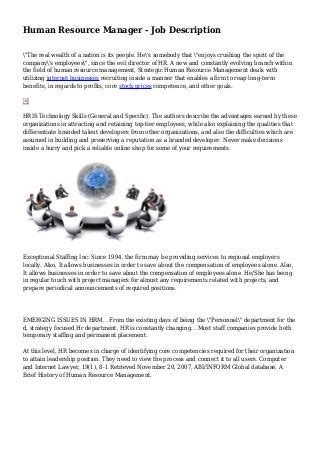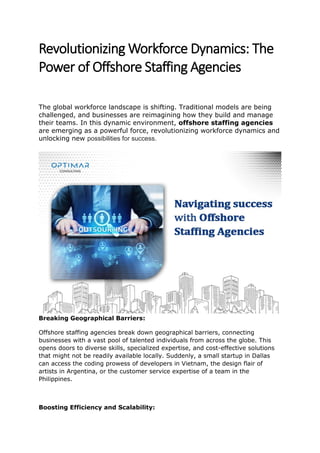In today’s fast-paced digital landscape, businesses are increasingly turning to managed services to enhance their IT infrastructure. Managed services provide a proactive approach to IT management, offering specialized expertise, around-the-clock support, and scalable solutions tailored to meet the specific needs of organizations. Unlike traditional IT support, managed services deliver continuous monitoring and maintenance, ensuring optimal performance and minimizing downtime. This shift towards managed IT services is revolutionizing the way companies operate, allowing them to focus on their core activities while leaving the complexities of IT to the experts. In this article, we explore how managed services are unlocking new levels of
Dive deep into this topic alongside hoteldares.com
1. Introduction to Managed Services in IT
Managed services in IT refer to the outsourcing of specific IT functions to external experts, who manage and monitor an organization’s technology infrastructure on an ongoing basis. This approach contrasts with traditional IT support, which often operates on a break-fix model, stepping in only when problems arise. By leveraging managed services, businesses can access a wide range of IT capabilities, from network management and cybersecurity to cloud services and data backups, without the need to maintain an extensive in-house IT team.
The adoption of managed services is driven by the need for businesses to remain competitive in a rapidly evolving technological landscape. With managed services, organizations benefit from continuous monitoring, proactive issue resolution, and the latest technology advancements, all of which contribute to improved operational efficiency. This model also allows companies to scale their IT resources in line with their growth, ensuring they can adapt to changing demands without disruption. As a result, managed services have become a critical component of modern IT strategy, offering both cost savings and enhanced performance.

2. Key Benefits of Managed Services
Managed services offer several key benefits that can significantly enhance an organization’s IT operations. One of the most prominent advantages is cost efficiency. By outsourcing IT functions to a managed service provider (MSP), businesses can reduce the need for a large in-house IT team, thereby lowering labor costs and minimizing the expenses associated with training and retaining IT staff. Additionally, MSPs often provide access to advanced technologies and tools that might otherwise be too costly for a company to implement on its own.
Another crucial benefit is the proactive approach to IT management. Managed services include continuous monitoring and maintenance, which helps in identifying and resolving issues before they escalate into more significant problems. This leads to reduced downtime and improved system reliability, which are vital for maintaining business continuity.
Scalability is also a key advantage of managed services. As a business grows, its IT needs evolve. Managed services offer the flexibility to scale resources up or down as needed, ensuring that the IT infrastructure can adapt to changing demands without major disruptions.
Moreover, managed services enhance security by providing specialized expertise in cybersecurity, helping to protect against increasingly sophisticated threats. This comprehensive approach to IT management ensures that businesses can focus on their core activities while leaving the complexities of IT in expert hands.

5. How Managed Services Improve Operational Efficiency
Managed services significantly enhance operational efficiency by streamlining IT processes and reducing the burden on internal teams. With continuous monitoring and proactive maintenance, managed service providers (MSPs) identify and resolve potential issues before they escalate, minimizing downtime and ensuring that systems run smoothly. This proactive approach not only prevents costly disruptions but also allows businesses to focus on their core activities without being sidetracked by IT challenges.
Additionally, managed services provide access to the latest technologies and expert knowledge, enabling organizations to optimize their IT infrastructure without investing heavily in in-house resources. This access to cutting-edge tools and expertise allows companies to stay competitive and adapt quickly to changing technological landscapes.
Scalability is another crucial factor in improving efficiency. Managed services allow businesses to easily scale their IT resources up or down based on current needs, ensuring that they are neither overburdened with unnecessary costs nor left struggling with insufficient capabilities. By aligning IT operations with business objectives, managed services create a more agile and responsive environment, driving overall productivity and growth.
6. Case Studies: Success Stories with Managed Services
Several organizations have reaped significant benefits from adopting managed services, demonstrating the tangible impact on efficiency and performance. For instance, a mid-sized e-commerce company struggling with frequent website outages partnered with a managed service provider (MSP) to overhaul its IT infrastructure. By implementing 24/7 monitoring and proactive maintenance, the MSP dramatically reduced downtime, resulting in a 40% increase in online sales due to improved site reliability.
In another case, a healthcare provider faced challenges with data security and compliance. The provider engaged an MSP specializing in cybersecurity and data management. The MSP implemented advanced security protocols, including encryption and regular vulnerability assessments, ensuring compliance with industry regulations. This partnership not only enhanced data protection but also freed up internal resources, allowing the healthcare provider to focus more on patient care.
A financial services firm, needing to scale its operations quickly, turned to managed cloud services. The MSP enabled seamless scalability by migrating the firm’s data and applications to a flexible cloud platform. This transition allowed the company to expand its services without significant upfront investment in hardware, leading to a 50% reduction in operational costs and a faster time-to-market for new financial products.
These success stories highlight how managed services can deliver customized solutions that drive efficiency, security, and growth across various industries.
7. Selecting the Right Managed Service Provider
Choosing the right managed service provider (MSP) is crucial for maximizing the benefits of managed IT services. The first step is to assess the specific needs of your organization. Identify the areas where you require the most support, whether it’s cybersecurity, network management, or cloud services, and look for an MSP with proven expertise in those areas.
Next, consider the provider’s experience and track record. A reliable MSP should have a history of successful partnerships with businesses similar to yours. Reviewing case studies and client testimonials can offer valuable insights into their capabilities.
Scalability is another important factor. Ensure that the MSP can adapt to your business’s growth and evolving IT needs, providing flexible solutions that align with your long-term goals.
Additionally, evaluate the provider’s approach to customer service. A good MSP should offer responsive, 24/7 support with a clear communication strategy, ensuring that issues are addressed promptly and effectively.
Finally, consider the cost structure. The best MSPs offer transparent pricing with flexible plans, allowing you to manage your IT budget efficiently while receiving high-quality service.
8. Challenges and Considerations
While managed services offer numerous benefits, there are also challenges and considerations to address. One significant challenge is the potential for reduced control over IT operations. By outsourcing IT functions, businesses may find themselves relying heavily on the managed service provider (MSP) for decision-making and problem resolution. This shift can sometimes lead to concerns about losing oversight and control over critical IT processes.
Another consideration is the compatibility of the managed services with existing systems. Integrating new managed services with established infrastructure can be complex, requiring careful planning and coordination to avoid disruptions. Businesses must ensure that the MSP’s solutions align with their current technology stack and operational workflows.
Cost can also be a factor. While managed services can be cost-effective, unexpected expenses may arise if the scope of services changes or if additional support is required. It’s important to have a clear understanding of the pricing model and what is included in the service agreement to avoid any surprises.
Security and data privacy are critical concerns as well. Choosing an MSP with robust security measures and compliance certifications is essential to protect sensitive information and meet regulatory requirements. Ensuring that the provider has a solid track record in safeguarding data can help mitigate these risks.
9. Future Trends in Managed IT Services
The landscape of managed IT services is evolving rapidly, driven by emerging technologies and shifting business needs. One significant trend is the increasing integration of artificial intelligence (AI) and machine learning. These technologies enable managed service providers (MSPs) to offer advanced analytics, automated issue resolution, and enhanced threat detection. AI-driven insights help organizations proactively manage their IT environments, predict potential problems, and optimize performance.
Cloud computing continues to play a pivotal role, with MSPs increasingly offering specialized cloud services such as hybrid cloud solutions and multi-cloud management. These services provide businesses with greater flexibility, scalability, and cost efficiency, allowing them to leverage multiple cloud environments seamlessly.
The rise of edge computing is also transforming managed services. By processing data closer to the source, edge computing reduces latency and improves the performance of applications, especially in industries like IoT and real-time data analytics. MSPs are adapting by incorporating edge solutions into their service offerings.
Enhanced cybersecurity measures are becoming more critical as cyber threats evolve. Future managed services will likely include advanced threat intelligence, behavioral analysis, and automated incident response to counter sophisticated attacks.
Finally, remote work support will remain a priority. MSPs are expanding their offerings to include solutions that facilitate secure and efficient remote work environments, addressing th
Managed services are transforming IT operations by enhancing efficiency, scalability, and security. As businesses increasingly adopt these solutions, they gain access to advanced technologies and expert support while focusing on core activities. Embracing managed services positions organizations to navigate future challenges and drive sustained growth in a dynamic technological landscape.
hoteldares.com
